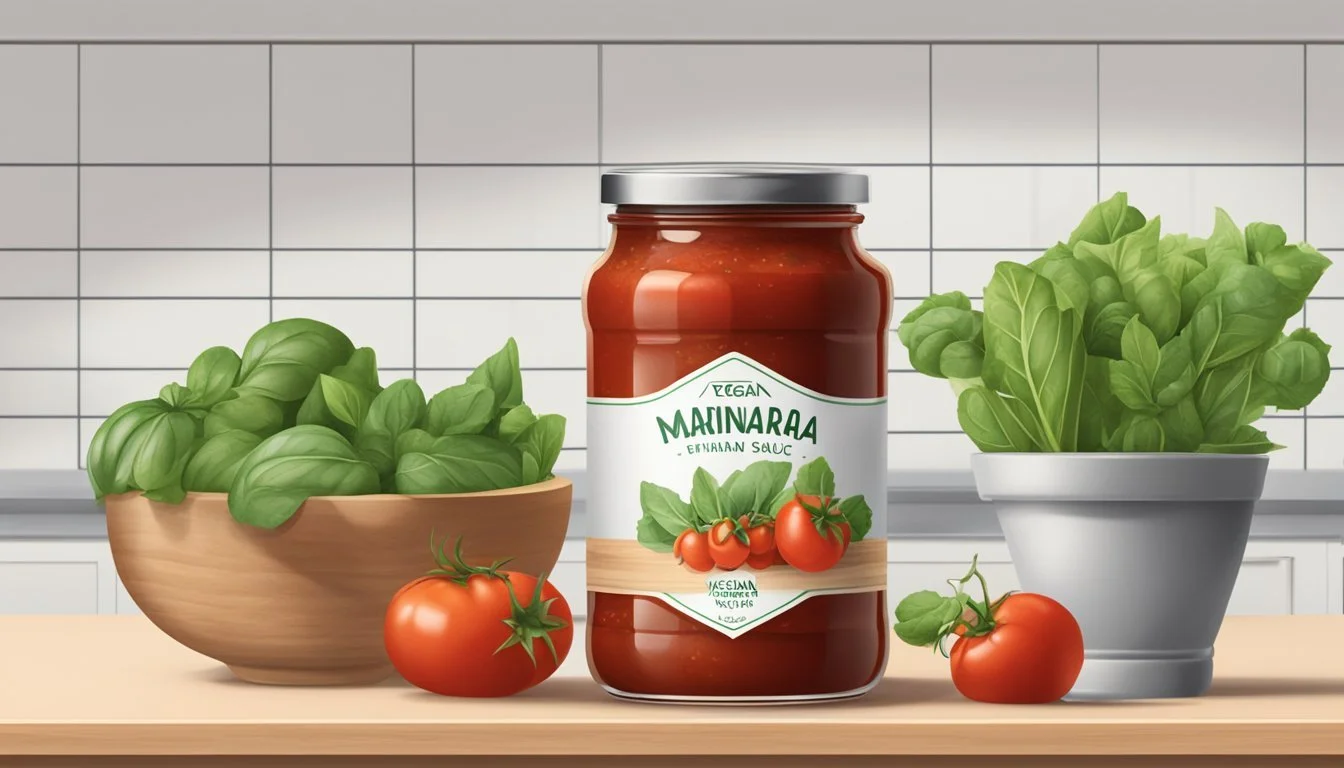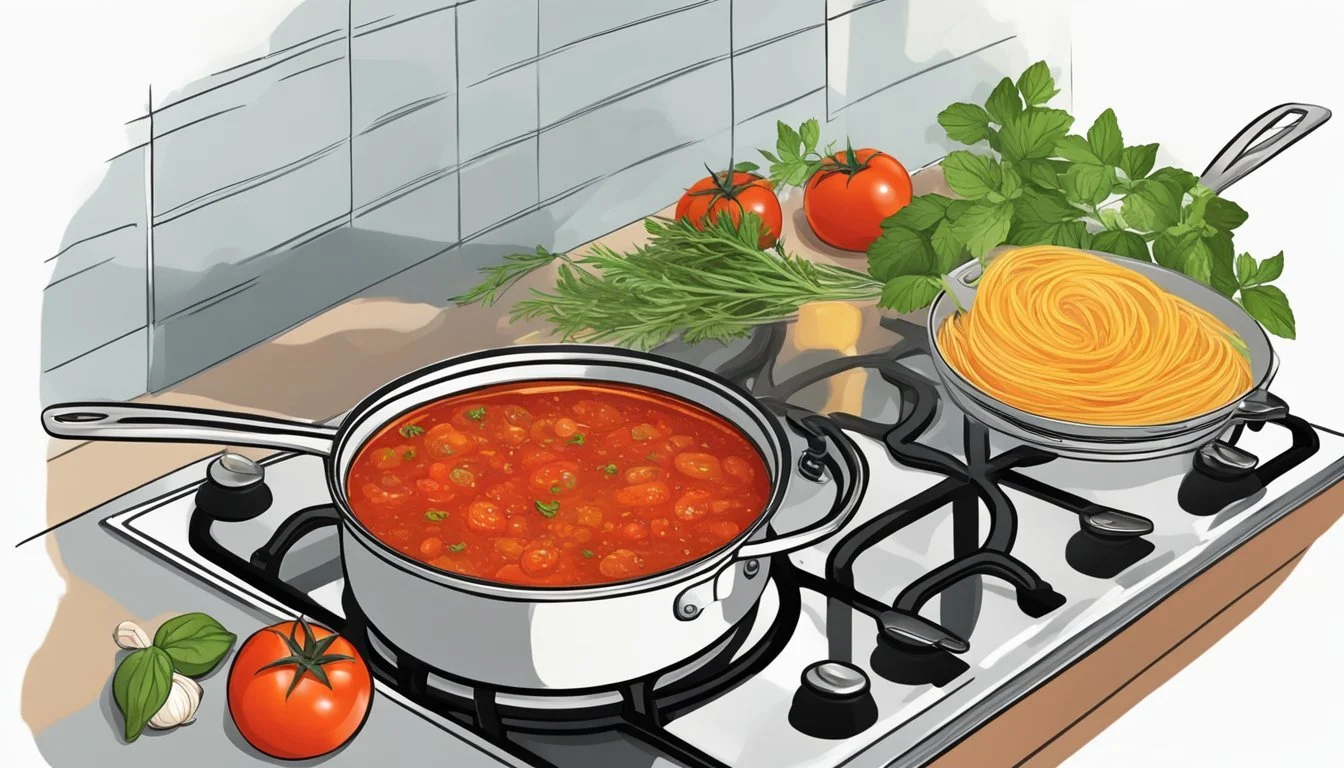Is Marinara Sauce Vegan?
Unveiling the Ingredients
Marinara sauce is a staple in many kitchens due to its versatility and rich flavor. It’s a simple tomato-based sauce that originated in Italy, traditionally made with tomatoes (What wine goes well with tomatoes?), garlic, herbs, and onions. The simplicity of its ingredients means that most marinara sauces are inherently vegan, as they do not require any animal products for their fundamental recipe.
In today's market, marinara sauce is available in various forms: store-bought, homemade, and in restaurants. For those following a vegan lifestyle, the primary concern is ensuring that the sauce does not include any hidden animal-derived ingredients, which can occasionally be added for flavor or texture. Thus, while marinara is typically vegan, vigilance is still crucial. Reading labels on store-bought sauces or inquiring about the ingredients when dining out is always recommended to ensure the sauce aligns with vegan standards.
What Is Marinara Sauce?
Marinara sauce is a fundamental component in Italian cuisine, known for its simple yet flavorful combination of ingredients. This sauce holds a place both in the history and on the tables of those who appreciate its classic taste.
Origins and History
Marinara sauce has its roots in the culinary tradition of Italy, believed to have originated in Naples. The term "marinara" is derived from "marinaro," meaning "of the sea," but ironically, the sauce itself is meatless and thought to have been prepared by sailors’ wives upon their return from sea. It served as a quick and hearty meal that could be easily cooked with the limited resources available.
Traditional Ingredients
The basic ingredients of marinara sauce include:
Tomatoes: Fresh or canned, they form the base of the sauce.
Garlic: Adds depth of flavor and is a staple in Italian sauces.
Basil: Offers freshness and a hint of sweetness.
Oregano: Provides an earthy and aromatic touch.
Olive Oil: Used for sautéing and enriching flavor.
Onion: Often included for its sweetness and texture.
Salt: Enhances the taste of all the ingredients.
Pepper: For a subtle spice to balance the sauce's flavor profile.
Often prepared by simmering these ingredients, marinara sauce is known for its versatility, commonly served over pasta, as a dipping sauce, or as a base for other dishes.
Is Marinara Sauce Vegan?
Traditional marinara sauce usually fits into a vegan diet, being primarily made from tomatoes, garlic, onions, herbs, and plant-based oils. It is important, however, for vegans to be aware of non-vegan ingredients that can sometimes be integrated into marinara sauce recipes or commercial products.
Identifying Non-Vegan Ingredients
The basic components of marinara sauce are inherently vegan. However, certain brands or recipes may add non-vegan ingredients for flavor enhancement. Shoppers and diners should watch out for:
Dairy: Some recipes include Parmesan cheese or other dairy products for a richer taste.
Meat Flavoring: Occasionally, sauces might contain meat or meat-based broths to deepen the flavor profile.
Monosodium Glutamate (MSG): While MSG is vegan, some individuals prefer to avoid it due to health concerns or dietary restrictions.
It is crucial for vegans to read labels carefully or inquire at restaurants to ensure the sauce does not contain these ingredients.
Common Vegan Substitutes
When making marinara sauce with a vegan perspective, some common substitutes for non-vegan ingredients include:
Vegan Parmesan: Nutritional yeast or commercially prepared vegan cheeses can provide a cheesy flavor without dairy.
Oil-Free Options: For those on oil-free vegan diets, water or vegetable broth can be used to sauté ingredients instead of oil.
These substitutes allow individuals following a vegan lifestyle to enjoy marinara sauce without compromising their dietary choices.
Preparing Vegan Marinara Sauce
Creating a flavorful vegan marinara sauce involves selecting quality tomatoes, enhancing with correct herbs and spices, and employing precise cooking techniques to blend the flavors together for a perfect blend of zest and savoriness.
Choosing The Right Tomatoes
For the base of the marinara sauce, San Marzano tomatoes are highly regarded; however, a variety of tomatoes can be used including fresh tomatoes, crushed tomatoes, diced tomatoes, or even canned tomatoes for convenience. The prep time is minimal—simply prepare or purchase your tomatoes in the desired form.
Fresh tomatoes should be ripe and juicy for a bright, fresh flavor.
San Marzano tomatoes, if canned, provide a consistent, sweet taste and are less acidic, ideal for a rich sauce.
Flavoring with Herbs and Spices
Herbs and spices are vital to creating an authentic marinara sauce. The recipe generally calls for:
Garlic: Key to any marinara recipe, it should be sautéed until fragrant.
Salt and ground black pepper: These should be added to taste.
Fresh basil leaves or dried basil: Essential for their aromatic qualities.
Dried oregano: Adds depth to the sauce.
A pinch of red pepper flakes can introduce a subtle heat that entwines nicely with the tomatoes' tang.
It's important to balance the flavors where none overpower the other but rather complement each other, enhancing the overall taste of the sauce.
Cooking Techniques
Marinara sauce generally employs simple stovetop cooking techniques and can be prepared in one pot, making for an easy-to-clean-up meal. The sauce can be started by:
Sautéing garlic to lay a flavorful foundation.
Adding tomatoes and herbs next, then bringing to a gentle boil.
For a smoother sauce, an immersion blender can be used, but it's not a necessity. Once all ingredients are combined, the sauce should simmer—usually for about 20 to 45 minutes, allowing flavors to meld and intensify. The result should be an inviting, homogenous sauce ready to be paired with your favorite pasta.
Vegan Marinara Sauce Recipes
Creating vegan marinara sauce at home is simple, and one can tweak recipes to align with individual flavor preferences and health considerations. Whether one desires a basic sauce or something richer, vegan marinara can be a versatile base for a multitude of dishes.
Simple Homemade Recipe
A fundamental vegan marinara sauce recipe involves simmering canned tomatoes with herbs like basil and oregano, with sautéed garlic added for depth. The entire process is quick, easily completed in 30 minutes. For a no-oil version, water or vegetable broth can be used in place of extra virgin olive oil to sauté garlic or onions.
Rich and Thick Variations
To achieve a more robust flavor and thicker consistency, adding tomato paste or blending in sun-dried tomatoes can help. Some chefs prefer incorporating a mix of vegetables such as red pepper or zucchini to enrich the sauce. Cooking times can be extended to allow flavors to deepen, anywhere from 20 minutes to an hour depending on the added ingredients.
Customizing Your Sauce
Marinara sauce can be customized in various ways:
Spiciness: Control the heat by adjusting red pepper flakes for a spicier kick.
Texture: Leave sauces chunky or blend for a smooth consistency.
Veggies: Make the sauce super healthy by adding a variety of vegetables like mushrooms or spinach.
Herbs: Fresh or dried herbs can be utilized to tailor the sauce to one's taste.
Each of these alterations can take a basic marinara and transform it into something unique and delightful, providing great value and versatility to any vegan meal.
Serving and Pairing Ideas
Marinara sauce is a versatile vegan sauce that lends a robust, tangy flavor to a variety of dishes, making it a staple in vegan cuisine. It serves as both a foundation and an accompaniment, transforming simple ingredients into vibrant culinary creations.
Pastas and Pizzas
Pasta: A classic pairing for marinara sauce is pasta. The sauce's rich tomato base complements the neutral taste of pasta, allowing it to be the star of dishes like spaghetti, penne, and even vegan lasagna. For a heartier meal, one could prepare a pasta bake, layering marinara with pasta and vegan cheese, then baking until bubbly.
Vegan Lasagna: Alternate layers of marinara sauce with sheets of lasagna pasta, vegan ricotta, and vegetables.
Pasta Bake: Toss pasta with marinara and vegan cheese, top with breadcrumbs, and bake till golden.
Pizza: When it comes to pizza, marinara sauce provides a tangy canvas for a variety of toppings. It's particularly well-suited for classic vegan pizzas topped with a melange of vegetables or even faux cheeses.
Vegan Pizza: Spread an even layer of marinara on a pizza crust, top with vegan cheese and assorted vegetables, and bake.
Dips and Sides
Dip: Marinara sauce excels as a dip for vegan-friendly appetizers. It pairs well with breadsticks, fresh bread, or crunchy vegetables, offering a simple yet satisfying taste enhancement.
Breadsticks: Serve marinara sauce warm as a dip for fresh or toasted breadsticks.
Olives: Offer a bowl of marinara sauce alongside a plate of mixed olives.
Sides: Consider serving marinara sauce with side dishes to infuse meals with its bold flavor. It can add complexity to vegan side dishes or serve as a dip or topping for various appetizers.
Bread: Toast slices of crusty bread and serve with a side of marinara for dipping.
Vegan Appetizers: Top vegan meatballs or stuffed mushrooms with a dollop of marinara sauce before serving.
Storing Vegan Marinara Sauce
Proper storage ensures that vegan marinara sauce retains its flavor and safety for future use. Containers should be chosen with care, and conditions optimized for the sauce's longevity, whether in the fridge or freezer.
Short-Term Refrigeration
For short-term storage, marinara sauce should be kept in the refrigerator. After cooling to room temperature, it should be transferred to an airtight container. Vegan marinara sauce typically remains fresh for up to 5 days when stored at or below 40°F (4°C). Labeling the container with the date of storage helps keep track of its shelf life.
Long-Term Freezing
Long-term freezing is suitable for extending the life of marinara sauce beyond the refrigerator's capacity. The sauce should be allowed to cool completely before being portioned into freezer-safe bags or containers. Laying bags flat while freezing can save space and allow for easier thawing. Vegan marinara sauce can be stored in the freezer for up to 6 months. It’s important to ensure that the container is sealed well to avoid freezer burn.
Reheating Instructions
When reheating vegan marinara sauce, one can use either a microwave or stove. In the microwave, place the sauce in a microwave-safe container, cover it, and heat in short intervals, stirring in between to ensure even warming. On the stove, transfer the leftovers into a pot and warm over low heat, stirring occasionally. If the sauce has been frozen, it is recommended to thaw it in the refrigerator overnight before reheating.
Nutritional Information
In assessing the nutritional aspects of marinara sauce, one considers its caloric content and macronutrient distribution, particularly noting its compatibility with a vegan diet.
Calories and Macronutrients
A standard serving of marinara sauce, which is approximately 1/2 cup (132g), contains an average of 66 calories. Within this serving, one can expect a nutrient composition delineated as follows:
Fat: 2g
Protein: 2g
Carbohydrates: 10g
Fiber: Not typically specified, but generally low
Sodium: 577mg
It’s important to highlight that these values can vary depending on the specific recipe or brand.
Benefits of a Vegan Diet
Marinara sauce typically aligns well with a vegan diet, which excludes animal products. Vegan diets can offer a range of health benefits when well-planned, including a potential for lower intake of saturated fats and higher consumption of certain beneficial nutrients due to an increased intake of vegetables, fruits, and whole grains.
Purchasing Vegan Marinara Sauce
When selecting a vegan marinara sauce, consumers must be attentive to the ingredients and may want to consider brands reputed for their vegan options. This ensures compliance with a plant-based diet, whether shopping in stores or dining out.
Reading Labels Carefully
Shoppers should meticulously examine the labels on store-bought marinara sauces to ensure they are devoid of any animal-derived products. Key ingredients to be vigilant about include organic parmesan, romano pasta sauce, or any pasteurized milk cheese cultures, which are non-vegan additions sometimes found in marinara sauces. Labels will often clearly indicate if the product is vegan, but in cases where they do not, one must scrutinize the ingredient list to make an informed decision.
Recommended Brands
For those who prefer convenience without the need for label scrutiny, several brands are known for their vegan marinara sauces:
Brand A: Offers an all-vegan tomato sauce, which is certified organic and free of animal byproducts.
Brand B: Known for a simple vegan marinara with no added sugars and Non-GMO Project Verified.
Brand C: Provides a variety of vegan sauces, including a flavorful marinara made with wholesome, natural ingredients.
In restaurants, diners should inquire whether the marinara used is vegan since some establishments may use sauces containing animal products. They can request the waitstaff to verify the ingredients or suggest a vegan-friendly option.
Conclusion
Marinara sauce generally qualifies as vegan. It is traditionally a simple concoction of tomatoes, garlic, herbs, and onions with possible inclusions like spices, olives, wine, and capers—all of which are plant-based ingredients.
When purchasing store-bought marinara sauce or consuming it in a restaurant, vigilance is advised. Consumers should check labels for non-vegan items, namely cheeses or meat flavorings that some brands or recipes might incorporate.
A typical homemade marinara sauce can be prepared with vegan principles in mind, using plant oils and excluding any animal-derived components. It can also be prepared without oil for those following an oil-free diet.
For those seeking alternatives, options such as a raw marinara sauce which use ingredients like sun-dried tomatoes and fresh herbs are available. These variants blend fresh ingredients to achieve a desirable consistency, suitable for numerous vegan dishes.
In summary, while marinara sauce is usually vegan, it is recommended to always review ingredient lists and restaurant menus to ensure they meet vegan standards.







